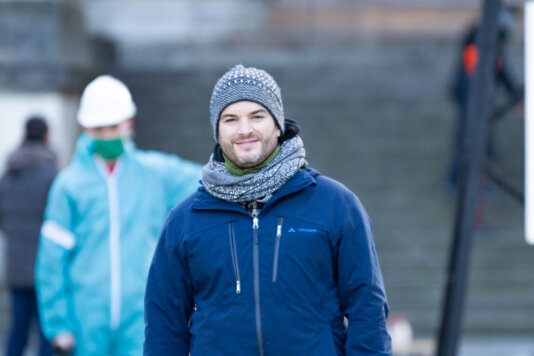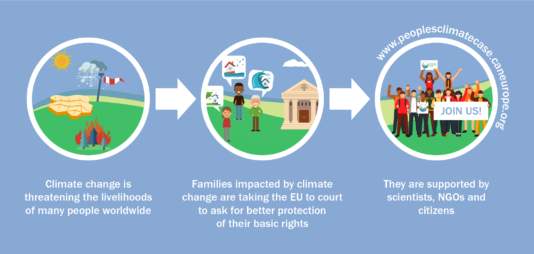- About
- Topics
- Picks
- Audio
- Story
- In-Depth
- Opinion
- News
- Donate
- Signup for our newsletterOur Editors' Best Picks.Send
Read, Debate: Engage.
| November 30, 2020 | |
|---|---|
| topic: | Climate action |
| tags: | #Markus Raschke, #climate change, #Protect-the-Planet, #carbon dioxide |
| located: | Portugal, Kenya, Germany |
| by: | Frank Odenthal |
FairPlanet spoke to Markus Raschke, who is in charge of the People's Climate Case at Protect-the-Planet.
FairPlanet: What is the status quo of the People's Climate Case?
Markus Raschke: It's still not about the matter itself, that is, the question of whether these people are affected, but rather the question of the jurisdiction of our lawsuit. So it is still a question of whether the legitimacy and the impact are given.
But everyone is affected by climate change, isn't it?
Yes of course. But there is a passage in European law that says that you have to be personally and individually affected. The plaintiffs are affected, as the judges have already signaled to us, but possibly not individually enough from the point of view of the court.
What does that mean?
Ultimately, there is probably a loophole here. Under the current legal status, one would have to be affected alone in order to be able to file a lawsuit at the European Court of Justice. So, for example, if my island sinks because of the rising sea level, then only I should be affected to be able to complain, but not my neighbor.
That sounds absurd.
I find it rather sad. And it also does not correspond to my personal sense of justice. After all, the judges have not yet finally dismissed the lawsuit, so maybe that's a good sign. Perhaps the judges also recognized this loophole.
And what would happen if the lawsuit were rejected again?
The ECJ likes to refer to the national courts. However, much is still unclear at the moment. But in October the EU decided to raise the carbon dioxide reduction target for 2030 to 60 percent, the lawsuit was even taken up in the parliamentary debate and is therefore already a success.
Lawsuits are primarily about specific people, not about NGOs or other institutions.
Meanwhile we‘ve got an example of a successful climate suit in the Netherlands.
Yes, there the NGO Urgenda sued the Dutch state, demanding to take more action to protect the climate. And the judges followed Urgenda's accusations. This led, in a first step, to the Netherlands reducing its speed limit on motorways to 100 km/h.
Do you cooperate with Urgenda on the People‘s Climate Case?
We are in close contact and of course we exchange ideas. From a legal point of view, it is particularly interesting to take a close look at what made Urgenda successful with their lawsuit.
But you always have to keep in mind that the lawsuits are primarily about specific people, not about NGOs or other institutions. And these people have to be accompanied in such processes, they have to be supported so that they bring their problems to court and are not intimidated by these huge institutions like the European Union.
Except for the Fiji plaintiff, you have visited all of the People‘s Climate Case plaintiffs. What were your impressions?
We checked with other NGOs whether there was an opportunity to take legal action, and as a result people from all over the world who are already affected by climate change contacted us. So we got in touch to see whether their motives are serious, whether they are really affected, but also to make sure that they know what they are getting into, because it can be a very long process. At the beginning of 2018 I was in Portugal with a forest engineer who, with tears in his eyes, led me through his completely burned-out forest. That was very moving. We then had a climate analysis carried out with the Climate Analytics Institute for each residential area of the plaintiffs in order to be able to present evidence in court. And the Portuguese forester found that in his area from 1960 to 2015 the amount of precipitation decreased by 60mm per decade. There, in the year of the fire, it was an average of 2.9 ° degrees warmer and 4.2 ° warmer in the daily temperature peak than in the years from 1980 to 2010.
Looking at the consequences of climate change today was certainly a profound experience ...
It was very interesting to get to know all these people, with their different worlds, different backgrounds, their problems, their cultures. And ultimately they all describe very similar phenomena: postponed rainy seasons, heat waves, rain that comes down as torrential rain – when it comes.
One of them was a farmer from Kenya ...
Yes, because from a legal point of view it is interesting to have non-EU citizens on board with the lawsuit. Anyone can sue the EU if its actions affect their rights. The plaintiff family from Kenya also asserts human rights. It is a farming family in northern Kenya, on the border with Ethiopia. There it was exciting to see how people deal with the dwindling water, cattle herders, farmers, families with children. Who can take how much water? That is already a question of survival there today and is likely to get worse in the future. It will provoke conflicts if the rainy season suddenly comes later or lasts only shortly. People in Kenya are affected by climate change in a completely different way than in Europe. They die from lack of water or starve to death or have to leave their homes.
Protect-the Planet will pay the legal fees for the People's Climate Case. What costs do you expect?
It was important to us that the families were not affected by impending legal costs, so we took care of that. Our legal team did the case pro bono. And we have also received some donations for the case, as many people are very moved by the fate of the plaintiff families.
About the background of Protect-the-Planet: The founding story begins with the commitment of a German entrepreneur, Ms. Dorothea Sick-Thies. Could you give us some details?
Dorothea Sick-Thies is an entrepreneur and environmental activist. Given the example of her father, Erwin Sick, the founder of Sick AG, she learned early that environmental protection must have top priority. So she came up with the idea of strengthening the environmental scene and, together with the director Carl Fechner and the networker Markus Gohr, launched the independent, not-for-profit NGO "Protect the Planet - Society for Ecological Change" in order to be able to participate in biodiversity and climate protection more actively with our small, but very effective team.
In addition to the People's Climate Case, Protect-the-Planet is also active in other areas. For example, „Zukunftsgespräche“ (english: "future talks"). What is it about?
It is about convincing people with responsibility, be it in politics or in business, to act in a sustainable and climate-friendly manner. Actually, it should have been a matter of course for a long time, after all, we have now 5 past 12 on the clock, and the point now is to save what can still be saved.
Protect-the-Planet also offers formal training as a campaigner. What are the details here?
Our campaigning school is an apprenticeship that we set up together with NGOs Wigwam and Germanwatch. People who design environmental or social campaigns should have the tools at hand they need, the various techniques that are needed, for example in project management or in dealing with the press and politics, with the public and with counter-campaigns. The demand for this training was unbelievably high, and the second year will soon start. The goal is that the scene, i.e. environmentalists and the social sector, becomes more powerful and assertive in the long term and that it is heard more, especially in politics.
If you dare to look into the future, what would it look like?
I hope that politicians will not only set binding climate targets for 2030, as we are calling for in the climate action, but that these words will be followed by action. It is sad that our climate targets for 2020 were only met thanks to the measures taken against the corona pandemic. I am skeptical as to whether the resolutions for 2030 and 2050 are worth the paper on which they are written, since the will to implement them politically is still far too low. Often even very small measures fail, and the survival of humanity is at stake here. Nevertheless, my hope and vision for the future is that the many young people who now protest on Fridays will develop our society for the better and we will learn to live frugally with our resources. Many small initiatives give me hope here, as do the plaintiff families, which show the world how necessary it is to act now in order to keep the world livable.
Markus Raschke is a project manager at Protect the Planet and, in this role, the officer in charge of climate action. Born in Munich in 1984, he studied political science and European economics in Passau, Leipzig and Breslau.
Already as a child he was actively involved in demonstrations at the State Association for Bird Protection, and as a student in school environmental groups, he was one of the initiators of the citizens' initiative Raus-aus-der-Steinkohle, which calls for Munich to phase out coal in 2022. The referendum was successfully adopted in 2017, but was dragged off by the city council.
He has been a project manager at Protect the Planet since 2018 and continues to fight for an early coal phase-out, divestment and traffic turnaround in Munich. He participated in the most successful German referendum on biodiversity „Rettet die Bienen“, ("Save the bees") in 2019. As the elected representative of the eco-radical Ecological Democratic Party (ÖDP) in the Upper Bavarian District Assembly, he regularly makes proposals for more biodiversity and climate protection. In his spare time he grows rare types of tomatoes.
By copying the embed code below, you agree to adhere to our republishing guidelines.


